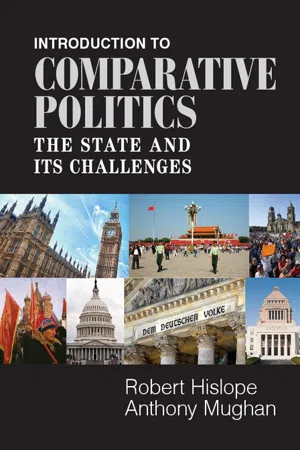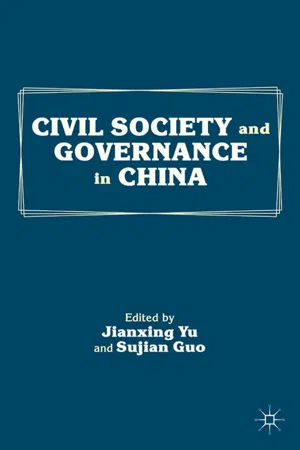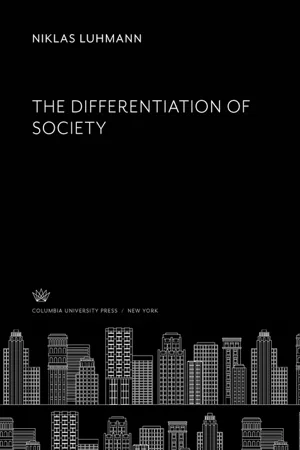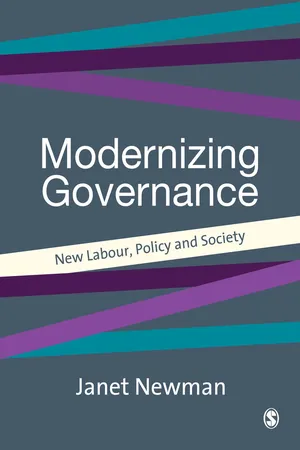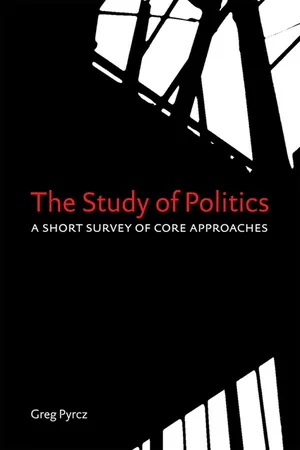Social Sciences
Government as an institution
Government as an institution refers to the system and structures through which a society makes and enforces decisions. It encompasses the legislative, executive, and judicial branches, as well as various administrative bodies. Governments are responsible for maintaining order, providing public services, and representing the interests of the population.
Written by Perlego with AI-assistance
Related key terms
1 of 5
6 Key excerpts on "Government as an institution"
- eBook - PDF
Introduction to Comparative Politics
The State and its Challenges
- Robert Hislope, Anthony Mughan(Authors)
- 2012(Publication Date)
- Cambridge University Press(Publisher)
This discussion of governance framework begins, however, with an explication of an important foundational term of discourse: political institution. 94 FRAMEWORKS OF GOVERNANCE 95 POLITICAL INSTITUTIONS The notion of an institution is ambiguous and can be conceptualized in different ways. From one perspective, an institution is an established organization with a physical presence. Thus, the Smithsonian Institu-tion, located in Washington, DC, is the world’s largest museum and research complex, with nineteen separate museums and nine research centers. It might be described as the archetypal cultural icon in the United States and its eminence results partly from just being there, and having been there for a long time. In the same way, political institutions are often associated in the popular mind with bricks and mortar. To men-tion the British Parliament, for example, conjures up for many pictures of a grandiose building on the banks of the River Thames in London. Similarly, many associate the institution that is the French presidency with the Elys ´ ee Palace in Paris. Such bricks-and-mortar buildings are noteworthy for housing the political actors routinely engaged in the law-making process. But a more important sense in which the term “institution” is com-monly used in political science focuses not on the inanimate buildings themselves, but on what goes on inside them. From this vantage point, a political institution is conceptualized as a set of relationships between political actors that is predictable, stable over time, evolves to meet chang-ing political circumstances, and comes to be valued for its own sake – in other words, it acquires legitimacy. When this state of affairs is reached, the relationships are said to have become “institutionalized,” or, put dif-ferently, a political institution has been put in place. This institution may be of interest in its own right or in its interactions with other institu-tions. - eBook - PDF
- Fulvio Attina(Author)
- 2011(Publication Date)
- Red Globe Press(Publisher)
To sum up, the world political system rests on a number of primary institutions which have been established over time – like diplomacy, law and war. They provide order and make international relations predictable, and act as a framework of organizational institutions through which the rules and policies regarding the basic problems of the world public arena are made. We refer to the governmental structure of the world political system as the set of the principal organizational institutions and of roles, practices and mechanisms through which political authority in the system is exercised. In this process policies are made and usually accepted as binding by states in their mutual relationships. By normally conforming to the practices of the world governmental structure, state governments recognize and legitimize it, although to differing extents and in different ways. This is because during the formative phase of every historical system a governmental structure is chosen which favours the values and interests of a coalition of states and especially of their leader. Once a governmental structure has been established, states assume different roles within it according to their own calculations of convenience. At this point it is worth explaining briefly the reasons for the prefer-ence, of the term ‘government’ instead of ‘governance’ in this analysis of the global system. Governance indicates the political function exercised by institutional and non-institutional actors which make use of institu-tional or non-institutional procedures. In state political systems, institu-tional procedures are applied to the matters which are in the formal (i.e. constitutional) competence of political institutions. This is government. The practice of governance is applied, on the other hand, to problem areas which are not in the formal competence of the state political system. - eBook - PDF
- J. Yu, Sujian Guo, J. Yu, Sujian Guo(Authors)
- 2012(Publication Date)
- Palgrave Macmillan(Publisher)
The need to consider moving from a set of preferences, expressed by individuals, institutional actors, or by social actors toward decisions also empha- sizes the process nature of governance. In general political science has Gov erna nce as Pol itic a l Theory 21 not been as effective in coping with process as might be expected, given that processes are so central to determining policy outputs. 3 Governance does not have its own approach to process, but it does emphasize the importance of understanding processes in order to understand choices. Governance as a Functionalist Argument In the Parsonian framework for society the polity was assigned the task of “goal attainment,” developing mechanisms for making and implementing collective policy choices to achieve important goals. Thus, in this sweeping conception of the organization of society the public sector is responsible for providing effective guidance to the other institutions such as the economy (adaptation) and even social- ization (integration). In this conception of how societies cope with their environment the public sector is assigned this crucial function. This is a rather simplistic characterization of the place of the state in society, but it does identify the crucial role of states in making policy and in steering society. At a lower level of generalization we can consider the functions that must be performed in the process of governing. The structur- al-functional approach, for example, argued that the basic decision- making functions were rule-making, rule application, and rule adjudication. 4 Political systems may differ in how they perform those functions but for the political system to function they all had to be performed. These functions are themselves, however, rather general and posed severe problems of operationalization for anyone attempt- ing to employ them empirically for comparison. - eBook - PDF
- Niklas Luhmann, Stephen Holmes, Charles Larmore, Stephen Holmes, Charles Larmore(Authors)
- 2019(Publication Date)
- Columbia University Press(Publisher)
7 Politics as a Social System At the present time, there is no uncontested theoretical foundation for research in the area of governmental politics and administration. The time is past when practical philosophy, which took ethics and natural law as self-evident points of departure, shaped what ques-tions were posed and what answers were considered. Power is now used only hesitantly as a fundamental concept and then only for a partial aspect. The state has remained a very vague category of little analytical use; it runs the danger of being amplified and constricted by various traditions and prejudices. Government is subject to the opposite weakness; by being viewed more precisely as an institution or organization, it no longer is understandable in its own terms. It seems that for some years the concept of a political system has been forcing its way into this theoretical vacuum and spreading rapidly for want of competing concepts. This is happening chiefly in the form of model building, developing different kinds of schemes for describing the structure and course of political pro-cesses (Easton 1965a; Almond 1965; Wiseman 1966; Nettl 1966; Senghaas 1968). Reflection upon what way political systems are indeed systems has only just begun (Easton 1965). It has not yet adequately clarified the advantages and limits of this conceptual approach. And it has by no means made use of what it could learn POLITICS AS A SOCIAL SYSTEM 139 from general systems theory, cybernetics, the sociology of social systems, the sociology of organizations, ethnology, psychological systems theory, and many more. At this stage of research it is not yet possible to pass a well-founded judgment on what the concepts of systems theory will be able to accomplish in this area. Opinions one way or the other will have to be preliminary, if not premature. It is thus all the more attractive to apply some general ideas in systems-theory from various disciplines to political systems. - eBook - PDF
Modernizing Governance
New Labour, Policy and Society
- Janet Newman(Author)
- 2001(Publication Date)
- SAGE Publications Ltd(Publisher)
1 Understanding governance Governance has become the defining narrative of British government at the start of the new century, challenging the commonplace notion of Britain as a unitary state with a strong executive. (Rhodes 2000b: 6) Why has governance become such a defining narrative? What kinds of political or cultural shift have shaped the increasing interest in this idea? Governance is an analytical concept, giving rise to questions about what forms of power and authority, patterns of relationship and rights and obligations might typify a particular approach to governing. But what most of the literature is interested in is change. As Rhodes puts it, ‘governance signifies a change in the meaning of government, referring to a new process of governing; or a changed condition of ordered rule; or the new method by which society is governed’ (Rhodes 1997: 46, original emphasis). Govern-ance has become a shorthand term used to describe a particular set of changes. It signifies a set of elusive but potentially deeply significant shifts in the way in which government seeks to govern (Pierre and Peters 2000). It denotes the development of ways of coordinating economic activity that transcend the limitations of both hierarchy and markets (Rhodes 1997; Smith 1999). It highlights the role of the state in ‘steering’ action within complex social systems (Kooiman 1993, 2000). It denotes the reshaping of the role of local government away from service delivery towards ‘community governance’ (Clarke and Stewart 1999; Stewart and Stoker 1988; Stoker 1999). These shifts are located in broader patterns of economic and social transformation. It is argued that the capacity of governments to control events within the nation state has been influenced by the flow of power away from traditional government institutions, upwards to transnational bodies and downwards to regions and sub-regions. - eBook - PDF
The Study of Politics
A Short Survey of Core Approaches
- Greg Pyrcz(Author)
- 2019(Publication Date)
- University of Toronto Press(Publisher)
The main tenet of institutionalism remains cogent, however: there is plenty of evidence that political conduct is coordinated by a complex system of rule-defined practices. Institutionalism is intellectually mod-est and empirical, and it allows a degree of predictability. Whether this is enough for grounding a science of politics remains an open debate. Applications Regardless of the debate at the level of agency and ontology, it remains true that what we can accomplish, as public servants, elected officials, parties or groups, or as individual citizens, is circumscribed by the often complex and intricate sets of rules that govern our conduct. Knowing what these rules are and how they differ in different polities remains a compelling basis for comparative studies, for predicting why some things happen in one nation or another (or in international relations, where rules have an arguably emergent role in the development of the international order). We know that when rendering judicial interpreta-tions within the nation-state, supreme courts are effectively constrained against advancing their own conceptions of the good, both by legal prec-edent and by constitutional documents often written centuries before. We know a fair bit about the comparative abilities of representatives in the American and Canadian legislative branches of government to advance proposals for new legislation, as such success is governed by the explicit rules and norms of legislative process. We know how divisions of the science of political studies 65 legislative power effectively shape the development of sub-states. Indeed, one of the more compelling laws of political life is the claim that politi-cal parties within Westminster-styled parliamentary systems are effec-tively governed by norms that determine the roles of government and opposition, that parties are shaped by the institutional features of legis-latures rather than by innovation, power, or the pursuit of interests.
Index pages curate the most relevant extracts from our library of academic textbooks. They’ve been created using an in-house natural language model (NLM), each adding context and meaning to key research topics.
